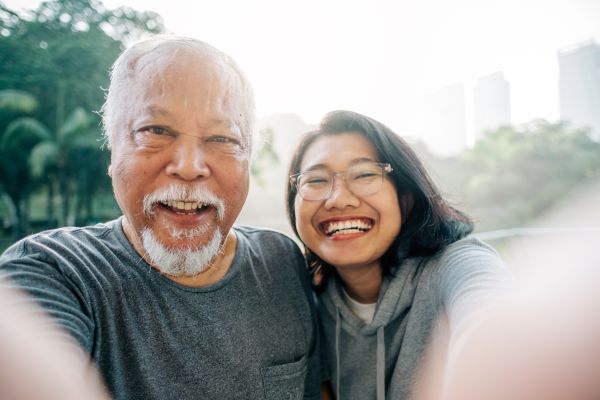Sugar and Starch: Understanding Their Impact on Senior Health As we age, our bodies undergo…
Nighttime Anxiety
Nighttime Anxiety is frequent, particularly among persons who obsess over traumatic events during the day or who are paranoid about every disturbance in the dark.
 People who suffer from anxiety at night may find it difficult to sleep, making the day more stressful and the anxiety worsening with time.
People who suffer from anxiety at night may find it difficult to sleep, making the day more stressful and the anxiety worsening with time.
Anxiety at night can be treated with the correct help.
Anxiety at night is not a distinct type of anxiety. People worry at night for the same reasons they worry during the day. However, the following variables may cause anxiety to be more visible at night:
People with anxiety disorders or risk factors for anxiety may be more prone to nighttime anxiety. Post-traumatic stress disorder (PTSD) or a recent trauma are two examples.
Anxiety can also be exacerbated by certain medical problems or hormonal imbalances. According to a 2019 study, nocturnal anxiety could be an indication of menopause in some individuals.
The following are some of the signs and symptoms of nocturnal anxiety:
The following treatments can aid in the management of nocturnal anxiety:
Therapy aims to address the source of anxiety while also assisting a person in developing good coping strategies.
According to the American Psychological Association, therapy is frequently more helpful than drugs. This could be due to the fact that therapy assists a person in identifying the source of an issue and addressing it in a positive manner.
Therapy is frequently used in conjunction with medication because medication can provide instant comfort, allowing a person to concentrate on the therapy.
Anxiety can be treated with a variety of methods, including cognitive behavioral therapy (CBT) and exposure therapy.
Anxiety drugs can help a person feel less anxious by altering the body’s physiologic response to anxiety.
Antidepressants influence the brain’s chemical messengers, called neurotransmitters. They can aid in the stabilization of a person’s mood or the reduction of stress.
It can take a long time for antidepressants to start working. Before evaluating whether or not a drug is successful, one should give it a chance.
The most frequent type of anti-anxiety drug is benzodiazepines. These medications usually start functioning practically immediately.
The neurotransmitter gamma aminobutyric acid is bound by benzodiazepines (GABA). This helps to slow down brain activity, making a person feel less worried. However, these treatments come with dangers that should be discussed with a doctor before taking them.
Beta-blockers are prescription drugs used to treat high blood pressure. Doctors do, however, occasionally prescribe these medications to deal with anxiety’s physical effects.
Sleeping tablets may assist patients in falling asleep more quickly, minimizing nightly restlessness. The American Academy of Sleep Medicine, on the other hand, claims that sleeping drugs only cut the time it takes to fall asleep by 8 to 20 minutes.
Because sleeping drugs might be addictive, it’s best to try other options first. Those who do take sleeping drugs should do the following:
Other options for dealing with evening anxiety include:
Nighttime anxiety can be debilitating and have a negative impact on a person’s quality of life.
There are a variety of therapies available for nighttime anxiety. Medication, speech therapy, and relaxation therapies are just a few examples.
Anyone suffering from nocturnal anxiety should get help as soon as possible. Treatment as soon as possible can help avoid the anxiety from worsening and causing more issues. A person can seek help from their primary care physician or a licensed therapist.
 People who suffer from anxiety at night may find it difficult to sleep, making the day more stressful and the anxiety worsening with time.
People who suffer from anxiety at night may find it difficult to sleep, making the day more stressful and the anxiety worsening with time.Anxiety at night can be treated with the correct help.
What causes nighttime anxiety?
Anxiety at night is not a distinct type of anxiety. People worry at night for the same reasons they worry during the day. However, the following variables may cause anxiety to be more visible at night:
- Because there are less distractions at night, a person is more inclined to think about the things that worry them.
- Caffeine consumption during the day can make a person jittery and nervous, making it difficult to sleep at night.
- Nightmares.
- The prospect of a new day fills me with dread.
- Anxiety about insomnia, especially if a person is concerned about the consequences of their lack of sleep the next day.
- People may be more aware of aches and pains as they fall asleep, which can cause health anxiety.
People with anxiety disorders or risk factors for anxiety may be more prone to nighttime anxiety. Post-traumatic stress disorder (PTSD) or a recent trauma are two examples.
Anxiety can also be exacerbated by certain medical problems or hormonal imbalances. According to a 2019 study, nocturnal anxiety could be an indication of menopause in some individuals.
Symptoms
The following are some of the signs and symptoms of nocturnal anxiety:
- Physical Symptoms of Anxiety: Anxiety can cause the following physical symptoms:
- palpitations in the heart
- problems with breathing
- sweating
- I’m feeling dizzy
- Anxiety attacks :A panic attack can be triggered by acute worry in certain people. A person may feel out of control or believe they are dying.
- Rumination is when a person obsesses over something that bothers or upsets them. The following are examples of possible triggers:
- monetary concerns
- a recent quarrel or disagreement
- Reliving a traumatic event
- Aches and pains: Tense muscles can cause aches and pains in some persons. These aches and pains might take the following forms:
- headaches
- jaw ache
- chest constrictions
- Nightmares: Some people are apprehensive about going to bed because they are afraid of having nightmares. People who suffer nightmares may wake up anxious and find it difficult to fall back asleep.
- Uncontrollable thoughts: An anxious person may believe that their thoughts are beyond their control. This can make you feel even more anxious.
Treatment
The following treatments can aid in the management of nocturnal anxiety:
Therapy
Therapy aims to address the source of anxiety while also assisting a person in developing good coping strategies.
According to the American Psychological Association, therapy is frequently more helpful than drugs. This could be due to the fact that therapy assists a person in identifying the source of an issue and addressing it in a positive manner.
Therapy is frequently used in conjunction with medication because medication can provide instant comfort, allowing a person to concentrate on the therapy.
Anxiety can be treated with a variety of methods, including cognitive behavioral therapy (CBT) and exposure therapy.
Anxiety treatment medication
Anxiety drugs can help a person feel less anxious by altering the body’s physiologic response to anxiety.
Antidepressants
Antidepressants influence the brain’s chemical messengers, called neurotransmitters. They can aid in the stabilization of a person’s mood or the reduction of stress.
It can take a long time for antidepressants to start working. Before evaluating whether or not a drug is successful, one should give it a chance.
Benzodiazepines
The most frequent type of anti-anxiety drug is benzodiazepines. These medications usually start functioning practically immediately.
The neurotransmitter gamma aminobutyric acid is bound by benzodiazepines (GABA). This helps to slow down brain activity, making a person feel less worried. However, these treatments come with dangers that should be discussed with a doctor before taking them.
Beta-blockers are a type of medication that prevents
Beta-blockers are prescription drugs used to treat high blood pressure. Doctors do, however, occasionally prescribe these medications to deal with anxiety’s physical effects.
Medications for sleep
Sleeping tablets may assist patients in falling asleep more quickly, minimizing nightly restlessness. The American Academy of Sleep Medicine, on the other hand, claims that sleeping drugs only cut the time it takes to fall asleep by 8 to 20 minutes.
Because sleeping drugs might be addictive, it’s best to try other options first. Those who do take sleeping drugs should do the following:
- Take the pills only when they’re needed
- and for as little time as possible.
- Don’t mix them with any other drugs, including alcoho
Other options for treatment and management
Other options for dealing with evening anxiety include:
- Caffeine reduction: Caffeine should be avoided before bedtime and consumed in moderation in the afternoon.
- Changes in diet: Certain meals keep some people awake at night. Keeping a journal of what they eat and any evening anxiety symptoms they encounter might help people discover and avoid troublesome items.
- Exercise. Exercise can help with anxiety and depression symptoms. High-intensity exercise programs may be more beneficial than low-intensity routines, according to a 2018 meta-analysis.
- Relaxation exercises: The sort of anxiety a person has can influence the effectiveness of relaxation techniques.
- Box breathing
- Gradual relaxation
- meditation with a guide
- Complementary and alternative medicine: The following strategies may aid in the relief of anxiety-related chronic pain:
- acupuncture
- massage
- chiropractic treatment
- Stress management: Learning how to manage daily stress will help you sleep better at night.
- Developing innovative time management tactics is an example.
- requiring assistance with household chores
- requiring professional assistance with financial or legal difficulties
Nighttime anxiety can be debilitating and have a negative impact on a person’s quality of life.
There are a variety of therapies available for nighttime anxiety. Medication, speech therapy, and relaxation therapies are just a few examples.
Anyone suffering from nocturnal anxiety should get help as soon as possible. Treatment as soon as possible can help avoid the anxiety from worsening and causing more issues. A person can seek help from their primary care physician or a licensed therapist.



